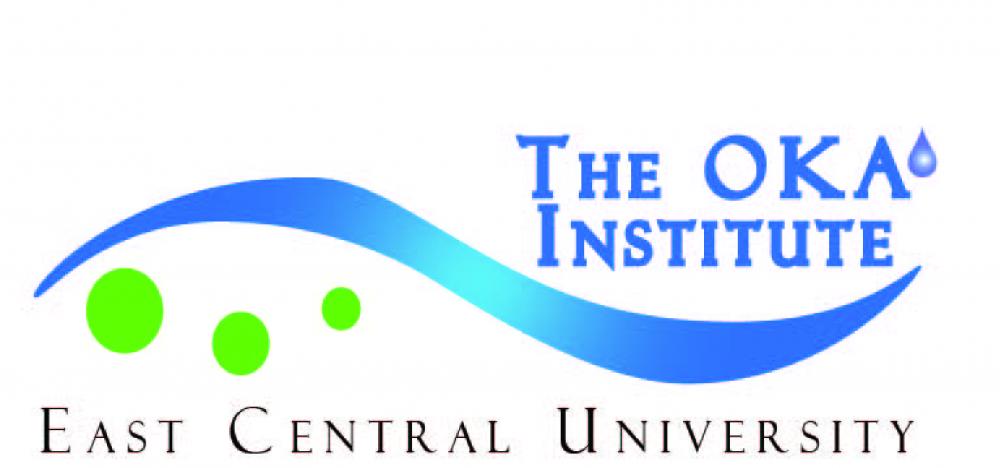Five East Central University faculty members are the inaugural Summer Research Opportunity Award winners for the Oka’ Institute, it was recently announced.
Dr. Randall D. Maples, assistant professor in ECU’s Department of Chemistry; Dr. J. Bruce Moring, assistant professor in the Department of Biology; Dr. Terrie Becerra and Dr. Erick Ananga, assistant professors in the Department of Political Science and Legal Studies and Dr. Nicholas Jacob, assistant professor in the Department of Mathematics and Computer Science developed proposals that are consistent with the Oka’ Institute’s research projects of enhancing aquifer recharge and groundwater and surface water interaction.
The five were selected by virtue of their close alignment with the Oka’ Institute’s goals of education, research, information and policy development.
In order to be considered for the Research Opportunity, ECU faculty had to first apply to become a research professor with the Oka’ Institute. Once their application was received, they were invited to submit a one-two page proposal outlining their research project, their goals/outputs and the supply and equipment budget of their project.
Each research professor selected will receive supplemental pay for the eight-week research period and must include 1-2 undergraduate research study positions in their project. Research students will receive a stipend for their work and have the unique opportunity to participate in research on ECU’s campus as an undergraduate.
Here is the biographical information on the five Summer Research Opportunity Award winners:
Dr. Randall Maples
Maples, who has held the rank of assistant professor of chemistry at ECU since 2016, earned a bachelor of science in chemistry from Southwestern Oklahoma State University and a doctorate of philosophy in analytical chemistry from Oklahoma State University. His research as an analytic chemist has examined nanotechnology and neurotoxicology. His research project is entitled: Quantitation of the movement of superparamagnetic iron oxide nanoparticles through porous media. Maples and students will conduct research into the use of nanoparticles as tracers for groundwater flow in subsurface environments. They will create and study the characteristics of dye linked, magnetically recoverable nanoparticles under a variety of environmental conditions, including those that could be representative of the Arbuckle-Simpson Aquifer.
Dr. J. Bruce Moring
Moring earned a doctorate of philosophy in ecology from the University of North Texas (1991), master of science in biology from Angelo State University (1986), master of science in zoology from Texas Tech University (1984) and a bachelor of science in biology from Angelo State (1982). Moring brings 21 years of applied research as freshwater ecologist and senior biologist with the U.S. Geological Survey’s Texas Water Science Center. He has additional experience overseeing the USGS’s National Water Quality Assessment Program from the Trinity River Basin in Texas. Moring’s research project is entitled: Synoptic Survey of the Ecological Status of Streams in the Upper Blue River Basin, Oklahoma. Moring and students will conduct a low-flow synoptic survey of the ecological status of perennial streams within the Upper Blue River Basin. The study will provide stream ecological data and associated interpretation that will support sustainable ecological management of streams in a river basin that is hydrologically dependent on groundwater inflows (base flow) from the Eastern Arbuckle-Simpson Aquifer.
Dr. Terrie Becerra and Dr. Erick Ananga
Becerra’s emphasis area is natural resources and the environment. She held post-doctoral positions at both Kansas State University (2013-2016) and Oklahoma State University (2010-2012) before coming to ECU in the fall of 2016. Her research has focused on attitudes, perceptions and beliefs related to watershed management, water governance structures in Kansas, grazing land biodiversity and attitudes regarding climate change in the Southern Great Plains.
Ananga earned a doctorate in geography and environmental science and policy from the University of South Florida, a master’s in politics and international development from the University of East Anglia Norwich UK and a bachelor in international development studies with economics major from the University of East Anglia Norwich UK. His research focuses on examining the tenability of community participation theory in explicating water production and management dynamics in urban informal neighborhoods. Previously, Ananga was an adjunct assistant professor at the School of Geosciences at the University of South Florida.
The research project for Becerra and Ananga is entitled: Mapping attitudes and behaviors regarding household water use in Ada, Oklahoma. Becerra, Ananga and students will conduct research to identify water consumption behavior, attitudes, perceptions and beliefs of Ada area water consumers. Collection and interpretation of this information will be beneficial for initiating proactive, sustainable water management practices for the greater Ada community.
Dr. Nicholas Jacob
Jacob received his bachelor’s degree in mathematics and physics in 2006 and his doctorate in applied mathematics in 2013, both from the University of Missouri. His graduate work was in statistical mechanics, creating a probability density function that captured the full dynamics of the system. Jacob has participated in research workshops sponsored by the National Science Foundation and the University of Oklahoma College of Medicine. His students have presented research regionally and nationally. Prior to his arrival at ECU, Jacob was a Mathematical Association of America NExT Fellow. His project is entitled: Economic Impact of Clean Water in Oklahoma. Jacob and students will examine the correlation between water resourced and economics in the Arbuckle-Simpson Aquifer of Oklahoma. This research group will use a hedonic pricing model in an attempt to look at how changes in water quality and quantity affect the price of homes, agricultural land, companies and any other industry with direct relation to the aquifer.
-ECU-

